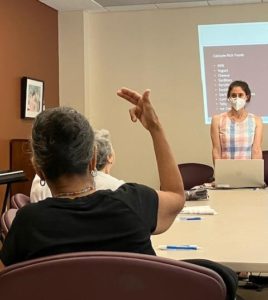Sep 7
Nutrition and Bone Health Presentation for Older Adults

Dalia Cohen, Springwell’s Director of Nutrition, recently visited the Beech Street Center in Belmont, the Brookline Senior Center, and the Newton Senior Center to share information with older adults about bone health.
Many older adults may learn from health care professionals that their bones are at risk for fractures due to osteopenia or osteoporosis. Bones are living tissue, made of collagen and calcium phosphate that is always being broken down and built up. Bones are strongest during our younger years. Osteoporosis starts as osteopenia, which means ‘softening of bones.’ When bones become very porous, osteoporosis has occurred. Bone breakdown has exceeded bone rebuilding and bone mass has decreased. Why do we care? People with osteoporosis are at greater risk of a bone fracture or break than people with healthy bones. Bone breaks and fractures can lead to or worsen other health problems due to limiting mobility. 50% of women and 25% of men over 50 in the United States suffer from Osteoporosis.
While many older adults face osteopenia and osteoporosis, there are things each of us can do to maximize our bone health as we age. Cohen shared general tips about nutrition, lifestyle, and exercise that help bone health but recommends that each person consult their physician about what is best for them. A healthy plan includes no smoking, limited intake of alcohol, a diet with adequate calcium and Vitamin D, and weight bearing exercise. It is often recommended that older adults consume 1200 mg of calcium daily as well as 800 IU or 20 mcg of Vitamin D. Weight bearing exercises cause the muscle to pull on bone, and the bone must strengthen in response. Only weight bearing exercise improves bone density.
Cohen shared some lists of calcium rich foods and Vitamin D rich foods with the attendees at the presentations. Calcium rich foods include milk, yogurt, cheese, sardines, fortified cereals, fortified juices, dark green vegetables, cottage cheese, tofu, and ice cream. Foods that are rich in Vitamin D include fatty fish such as mackerel, salmon, and tuna as well as egg yolks and beef liver. Cohen also recommends consuming five or more servings of fruits and vegetables daily and six ounces of lean meat or beans for protein that bones need. Fruits and vegetables provide vitamin C, magnesium, vitamin K, and potassium to strengthen bones.
Doing what we can to maximize bone health contributes to overall well-being for older adults.


